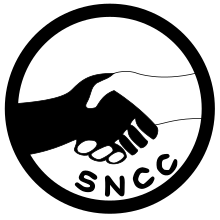
Back لجنة التنسيق الطلابية اللاعنفية Arabic Student Nonviolent Coordinating Committee Czech Student Nonviolent Coordinating Committee German Comité Coordinador Estudiantil No Violento Spanish کمیته هماهنگی دانشجویان علیه خشونت Persian Student Nonviolent Coordinating Committee Finnish Student Nonviolent Coordinating Committee French Student Nonviolent Coordinating Committee Italian 학생 비폭력 조정 위원회 Korean Consilium Copulandi Non Violentum Scholasticorum Latin
 | |
| Abbreviation | SNCC |
|---|---|
| Formation | 1960 |
| Founder | Ella Baker |
| Dissolved | 1970 |
| Purpose | Civil rights movement Participatory democracy Pacifism Black Power |
| Headquarters | Atlanta, Georgia |
Region | Deep South and Mid-Atlantic |
Main organ | The Student Voice (1960–1965) The Movement (1966–1970) |
| Subsidiaries | Friends of SNCC Poor People's Corporation |
| Affiliations | |
The Student Nonviolent Coordinating Committee (SNCC, pronounced /snɪk/ SNIK) was the principal channel of student commitment in the United States to the civil rights movement during the 1960s. Emerging in 1960 from the student-led sit-ins at segregated lunch counters in Greensboro, North Carolina, and Nashville, Tennessee, the Committee sought to coordinate and assist direct-action challenges to the civic segregation and political exclusion of African Americans. From 1962, with the support of the Voter Education Project, SNCC committed to the registration and mobilization of black voters in the Deep South. Affiliates such as the Mississippi Freedom Democratic Party and the Lowndes County Freedom Organization in Alabama also worked to increase the pressure on federal and state government to enforce constitutional protections.
By the mid-1960s the measured nature of the gains made, and the violence with which they were resisted, were generating dissent from the group's principles of nonviolence, of white participation in the movement, and of field-driven, as opposed to national-office, leadership and direction. At the same time some original organizers were now working with the Southern Christian Leadership Conference (SCLC), and others were being lost to a de-segregating Democratic Party and to federally-funded anti-poverty programs. Following an aborted merger with the Black Panther Party in 1968, SNCC effectively dissolved.
Because of the successes of its early years, SNCC is credited with breaking down barriers, both institutional and psychological, to the empowerment of African-American communities.